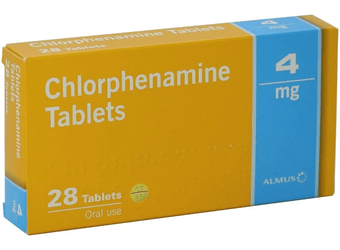Medication features
Chlorphenamine 4mg Tablets are an effective treatment for different types of allergic reactions from insect bites, nettle rash, or other allergies that cause itchy skin rashes. They can also be used as a preventative measure for allergies such as hay fever, house dust mite allergies, food allergies, and pet allergies.
- Used to Treat Hay-Fever
- Fast-Acting
- Prevents allergic symptoms
Overview
What Is Chlorphenamine?
Chlorphenamine, also known as chlorphenamine maleate, is a medicine that relieves symptoms of allergies and colds. It is also sold under the brand names Allerief, Hayleve and Pollenase in the UK.
The active ingredient of chlorphenamine is chlorpheniramine maleate. Chlorphenamine also contains inactive ingredients including D&C yellow #10 (a synthetic dye), lactose anhydrous and magnesium stearate.
What Is Chlorphenamine Used For?
This medicine is an antihistamine that is effective in relieving symptoms such as:
- Cough
- Runny or blocked nose
- Watery or itchy eyes
- Itchy nose or throat
- Itchy skin and rash
Chlorphenamine typically comes in 4mg tablets but is also available in liquid form. You may be prescribed chlorphenamine if you have:
How Does Chlorphenamine Work?
Chlorphenamine is an antihistamine which works by blocking the effects of histamine. Histamine is a chemical that the body produces naturally when you come into contact with a substance that you are allergic to such as animal fur or hair, pollen, insect bites and stings, or house dust.
Some symptoms of allergic reactions and colds are caused by histamine. By blocking the effects of histamine, chlorphenamine can be effective in relieving these symptoms. Chlorphenamine also blocks acetylcholine - a naturally-produced enzyme that manages bodily fluids – from affecting the body, relieving a runny nose and watery eyes.
Classed as a drowsy antihistamine, chlorphenamine is more likely to make you feel sleepy than other types of antihistamines.
Chlorphenamine and Alcohol
You shouldn’t take alcohol while you’re taking chlorphenamine. That’s because this medicine can make you feel very sleepy. Mixing alcohol with chlorphenamine can increase your chance of side effects such as drowsiness and feeling sick, and can be potentially dangerous.
Chlorphenamine in Pregnancy
If you are pregnant, you can use chlorphenamine. There is no evidence that it could harm your baby. However, you should be aware of potential side effects such as drowsiness. Your doctor might advise you to take a non-drowsy antihistamine such as loratadine, rather than chlorphenamine.
So long as your baby is healthy, you can use chlorphenamine while breastfeeding. The amount of chlorphenamine that gets into breast milk isn’t known, but prolonged use could lead to side effects such as sleepiness in your baby. For this reason, only occasional use of chlorphenamine is typically recommended while breastfeeding.
Before taking chlorphenamine, tell your doctor if you are; pregnant, trying for a baby or breastfeeding.
Chlorphenamine vs Cetirizine
Like chlorphenamine, cetirizine is an antihistamine medicine that comes in tablet form and relieves the symptoms of allergies and colds. Chlorphenamine and cetirizine can both be given to people with hay fever, a cold, conjunctivitis (red and itchy eyes), hives, eczema, or an insect bite or sting. Both of these medications can be prescribed but also purchased from an online, high street or supermarket pharmacy without a prescription. Chlorphenamine and cetirizine are also available in liquid form.
One major difference is that chlorphenamine is classed as a drowsy antihistamine because it can make you feel sleepy, whereas cetirizine belongs to the non-drowsy category of antihistamines, being less likely to make you tired. For this reason, a non-drowsy antihistamine such as cetirizine may be preferable for people who are anxious that a drowsy antihistamine will disrupt their daily routine. A drowsy antihistamine may be more suitable if you have symptoms which are keeping you awake at night, like itchy skin or a cough.
There is insufficient evidence to conclude that either chlorphenamine or cetirizine is more effective than the other. How well the two treatments work will vary from person to person. If chlorphenamine or cetirizine does not relieve your symptoms, your doctor may recommend another type of antihistamine.
Chlorphenamine Reviews
Users with one or more allergy have commented on the effectiveness of chlorphenamine to relieve their symptoms such as a runny or blocked nose, sneezing and itchy or watery eyes. Some reviewers online have commented that they have been taking chlorpheniramine for over a decade to relieve their allergy symptoms. Users have explained that chlorphenamine was the first medication which worked in relieving their symptoms after they had tried treatments such as other antihistamines, decongestants and steroid sprays.
Taken every 4 hours, numerous reviewers have reported that chlorpheniramine controlled their allergy symptoms. Some reviewers have highlighted chlorphenamine’s ability to relieve their symptoms within an hour, including symptoms such as a runny nose in a matter of minutes. Among the side effects mentioned by users are drowsiness and dehydration.
Can You Buy Chlorphenamine Over the Counter?
You don’t need a prescription to buy chlorphenamine tablets. Once you’ve completed a short online consultation, you can buy the treatment quickly and conveniently through Cloud Pharmacy’s online pharmacy. After being approved by one of our online pharmacists, your chlorphenamine can be dispensed and dispatched in a discreet package with next-day delivery.
Directions
Side Effects
Patient Information Leaflet
Chlorphenamine 4mg tablets Reviews
Confirm Chlorphenamine 4mg tablets treatment selection
| 4mg | 28 | £4.99 |
| 4mg | 56 | £7.98 |
| 4mg | 84 | £11.99 |
| 4mg | 112 | £15.99 |
| 4mg | 168 | £23.94 |

















